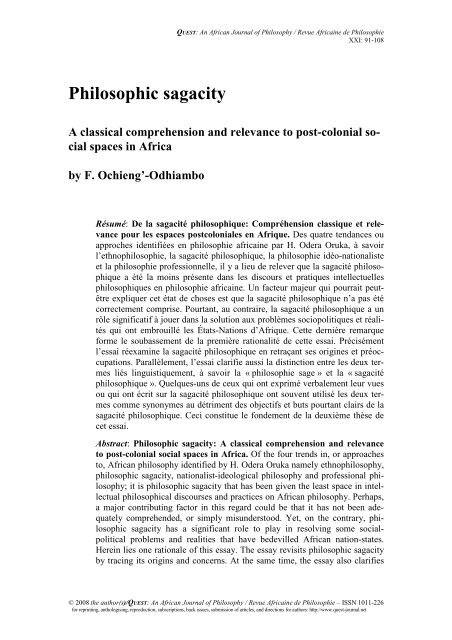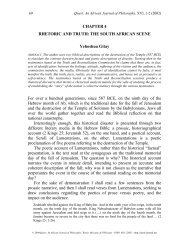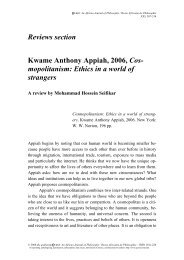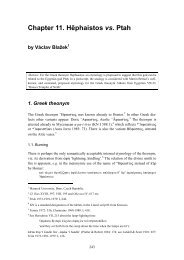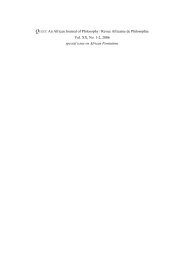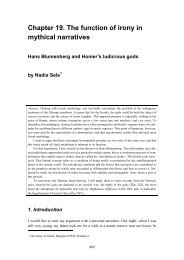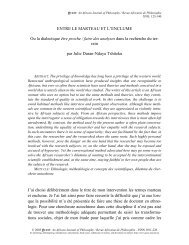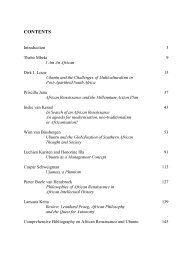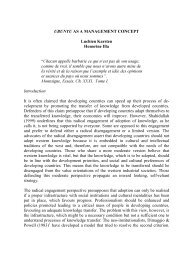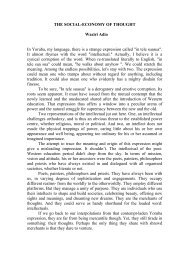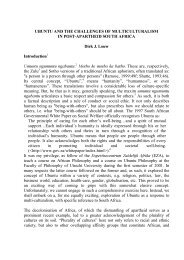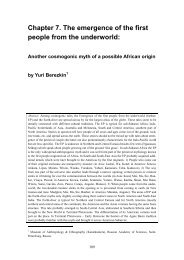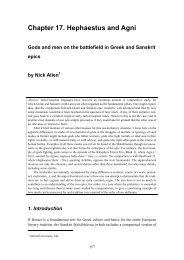Philosophic sagacity - Quest-journal.net
Philosophic sagacity - Quest-journal.net
Philosophic sagacity - Quest-journal.net
Create successful ePaper yourself
Turn your PDF publications into a flip-book with our unique Google optimized e-Paper software.
QUEST: An African Journal of Philosophy / Revue Africaine de Philosophie<br />
XXI: 91-108<br />
<strong>Philosophic</strong> <strong>sagacity</strong><br />
A classical comprehension and relevance to post-colonial social<br />
spaces in Africa<br />
by F. Ochieng’-Odhiambo<br />
Résumé: De la sagacité philosophique: Compréhension classique et relevance<br />
pour les espaces postcoloniales en Afrique. Des quatre tendances ou<br />
approches identifiées en philosophie africaine par H. Odera Oruka, à savoir<br />
l’ethnophilosophie, la sagacité philosophique, la philosophie idéo-nationaliste<br />
et la philosophie professionnelle, il y a lieu de relever que la sagacité philosophique<br />
a été la moins présente dans les discours et pratiques intellectuelles<br />
philosophiques en philosophie africaine. Un facteur majeur qui pourrait peutêtre<br />
expliquer cet état de choses est que la sagacité philosophique n’a pas été<br />
correctement comprise. Pourtant, au contraire, la sagacité philosophique a un<br />
rôle significatif à jouer dans la solution aux problèmes sociopolitiques et réalités<br />
qui ont embrouillé les États-Nations d’Afrique. Cette dernière remarque<br />
forme le soubassement de la première rationalité de cette essai. Précisément<br />
l’essai réexamine la sagacité philosophique en retraçant ses origines et préoccupations.<br />
Parallèlement, l’essai clarifie aussi la distinction entre les deux termes<br />
liés linguistiquement, à savoir la « philosophie sage » et la « sagacité<br />
philosophique ». Quelques-uns de ceux qui ont exprimé verbalement leur vues<br />
ou qui ont écrit sur la sagacité philosophique ont souvent utilisé les deux termes<br />
comme synonymes au détriment des objectifs et buts pourtant clairs de la<br />
sagacité philosophique. Ceci constitue le fondement de la deuxième thèse de<br />
cet essai.<br />
Abstract: <strong>Philosophic</strong> <strong>sagacity</strong>: A classical comprehension and relevance<br />
to post-colonial social spaces in Africa. Of the four trends in, or approaches<br />
to, African philosophy identified by H. Odera Oruka namely ethnophilosophy,<br />
philosophic <strong>sagacity</strong>, nationalist-ideological philosophy and professional philosophy;<br />
it is philosophic <strong>sagacity</strong> that has been given the least space in intellectual<br />
philosophical discourses and practices on African philosophy. Perhaps,<br />
a major contributing factor in this regard could be that it has not been adequately<br />
comprehended, or simply misunderstood. Yet, on the contrary, philosophic<br />
<strong>sagacity</strong> has a significant role to play in resolving some socialpolitical<br />
problems and realities that have bedevilled African nation-states.<br />
Herein lies one rationale of this essay. The essay revisits philosophic <strong>sagacity</strong><br />
by tracing its origins and concerns. At the same time, the essay also clarifies<br />
© 2008 the author(s)/QUEST: An African Journal of Philosophy / Revue Africaine de Philosophie – ISSN 1011-226<br />
for reprinting, anthologising, reproduction, subscriptions, back issues, submission of articles, and directions for authors: http://www.quest-<strong>journal</strong>.<strong>net</strong>
F. Ochieng’-Odhiambo<br />
the distinction between the two linguistically related terms ‘sage philosophy’<br />
and ‘philosophic <strong>sagacity</strong>’. Some of those who have said or written something<br />
on <strong>sagacity</strong> in African philosophy have often used them synonymously at the<br />
expense of the clear objectives and aims of the latter. Herein is to be found another<br />
rationale of the essay.<br />
Mots clefs: Odera Oruka, sagacité philosophique, racines philosophiques de la<br />
culture, naïveté philosophique, moralité technologique, sagacité populaire,<br />
ethnophilosophie, école de philosophie professionnelle.<br />
Key words: Odera Oruka, philosophic <strong>sagacity</strong>, philosophical roots of culture,<br />
philosophical naivety, technological morality, folk <strong>sagacity</strong>, ethnophilosophy,<br />
professional school.<br />
Introduction<br />
As an approach to African philosophy, philosophic <strong>sagacity</strong> made its<br />
maiden appearance in international philosophical discourse in 1978 during<br />
the commemoration of Dr. Anthony William Amo 1 Conference held<br />
in Accra, Ghana. This was by way of Kenyan philosopher H. Odera<br />
Oruka’s presentation titled ‘Four Trends in Current African Philosophy’.<br />
The following year, Odera Oruka read a slightly different version of the<br />
essay during the 16 th World Congress of Philosophy in Dusseldorf, Germany.<br />
The essay has been seminal in academic African philosophy. Besides<br />
the essay, Odera Oruka authored several others, including two texts,<br />
in the area of African philosophy most of them focussing on philosophic<br />
<strong>sagacity</strong>. It is therefore not surprising that he is generally regarded not<br />
only as the icon of philosophic <strong>sagacity</strong>, but its progenitor as well.<br />
As is the case with the other approaches to African philosophy,<br />
philosophic <strong>sagacity</strong> has had its share of critics. However, this essay does<br />
1 Amo was born in present-day Ghana in 1703. At the tender age of four years, he was<br />
in Amsterdam possibly as a slave though other possibilities have been offered as well.<br />
Whatever the case might have been, while in Europe, he exhibited great intellectual<br />
élan, successfully undertaking undergraduate and graduate studies in various fields of<br />
study namely law, medicine, psychology, and philosophy. He later taught at the<br />
universities of Halle and Jena in what is now the Federal Republic of Germany, and<br />
published several philosophical works. He returned to his native land in Ghana in<br />
1753 and died soon thereafter.<br />
92
<strong>Philosophic</strong> <strong>sagacity</strong><br />
not seek to directly address some of these specific criticisms. It is a general<br />
disquisition on philosophic <strong>sagacity</strong> meant to give an accurate exegesis<br />
and account of the approach. Many may be under the false impression<br />
that the approach found its way into the philosophical arena in the early<br />
1980s. 2 Others may query its relevance beyond proving the obvious that<br />
sages existed or exist in traditional Africa. Yet still, some may wonder<br />
what sets it apart from ethnophilosophy. Such impressions, queries, and<br />
wonders may be made redundant by a proper understanding of philosophic<br />
<strong>sagacity</strong>. In its specificity, this essay has three objectives. These are:<br />
(1) To trace and enunciate the origins of philosophic <strong>sagacity</strong> as an approach<br />
to African philosophy in academic intellectual discourse. (2) To<br />
highlight its relevance to modern African nation-states, despite its anchorage<br />
in traditional Africa. (3) To decipher the distinction between philosophic<br />
<strong>sagacity</strong> and sage philosophy, given that too often, some<br />
individuals have definitively, though at times mistakenly, used the two<br />
terms interchangeably.<br />
Origins of <strong>Philosophic</strong> Sagacity: Odera Oruka’s Two<br />
Research Projects<br />
Despite the fact that philosophic <strong>sagacity</strong> was pronounced to the international<br />
community in 1978, many seem not to be aware that Odera Oruka<br />
had actually started work on it a couple of years earlier in his two, though<br />
related, research projects, one in 1974 and the other in 1976. In other<br />
words, though he first employed the term ‘philosophic <strong>sagacity</strong>’ in his<br />
1978 essay, it is apparent that his 1974 and 1976 projects were exercises<br />
in philosophic <strong>sagacity</strong>. The two research projects therefore rightfully<br />
demarcate the origins of philosophic <strong>sagacity</strong>. Hence, contrary to conventional<br />
belief, the birth year of philosophic <strong>sagacity</strong> within academia predate<br />
1978. Knowledge of this fact, as will be apparent below, is<br />
fundamental in that it not only enhances the general comprehension of the<br />
2 This is because, though H. Odera Oruka read the paper ‘Four Trends in Current<br />
African Philosophy’ in 1978, it was only published in 1981.<br />
93
F. Ochieng’-Odhiambo<br />
approach but also highlights its significance to the social-political realities<br />
of modern Africa.<br />
In 1974, together with some of his colleagues at the Department of<br />
Philosophy and Religious Studies, notable among them the charismatic<br />
philosopher and theologian Joseph Donders, Odera Oruka formulated a<br />
research project at the University of Nairobi, Kenya. It was entitled<br />
‘Thoughts of Traditional Kenyan Sages’. At its inception, the immediate<br />
aim of the project was to address the following question:<br />
Would it be possible to identify persons of traditional African culture, capable<br />
of the critical, second-order type of thinking about the various problems of<br />
human life and nature; persons, that is, who subject beliefs that are traditionally<br />
taken for granted to independent rational re-examination and who are inclined<br />
to accept or reject such beliefs on the authority of reason rather than on<br />
the basis of a communal or religious consensus? 3<br />
In 1976, Odera Oruka designed yet another related research proposal<br />
of national and social significance. On the face of it, the project appeared<br />
rather ambitious given the enormity of its attendant implications in<br />
terms of duration and resources necessary for the fulfillment of its objectives.<br />
The project was titled ‘The <strong>Philosophic</strong>al Roots of Culture in<br />
Kenya’. In the proposal, researches were initially meant to cover the<br />
Western part of Kenya. The ultimate objective however was:<br />
To uncover and map out the philosophical ideas which underlie some of the<br />
main cultural practices of Western Kenya. This would be treated as a regional<br />
investigation which, if co-ordinated and supplemented with researches from<br />
other parts of the Republic would provide an over all [sic] pattern of the Philosophy<br />
of Kenyan National Culture. 4<br />
The objective of the 1976 research proposal was premised on two assumptions.<br />
First, philosophy is always the moving spirit and the theoretical framework of<br />
3 H. Odera Oruka, ‘African Philosophy: The Current Debate’ in H. Odera Oruka, ed;<br />
Sage Philosophy: Indigenous Thinkers and Modern Debate on African Philosophy,<br />
Nairobi: ACTS Press, 1991, p. 17.<br />
4 H. Odera Oruka, ‘The <strong>Philosophic</strong>al Roots of Culture in Kenya’, unpublished<br />
research proposal presented to the Ministry of Culture and Social Services,<br />
Government of Kenya, 1976, p. 8.<br />
94
<strong>Philosophic</strong> <strong>sagacity</strong><br />
any national culture. Any serious and meaningful national culture must have a<br />
philosophy. Second, because Kenya as a State is struggling tirelessly to<br />
ground itself permanently as a nation – and a national culture is always the<br />
axis of a nation. 5<br />
Given the gist of the two research projects one cannot fail to<br />
fathom that they were exercises in what Odera Oruka later christened<br />
‘philosophic <strong>sagacity</strong>’. The 1974 project sought to identify philosophic<br />
sages, whereas the 1976 one was geared towards engaging their thoughts<br />
for the sake of social cohesion and national prosperity. 6<br />
Significance of the Two Research Projects<br />
(a) The 1974 Project<br />
The late 1960s through to the 1970s was a turbulent period for African<br />
philosophy. It was the period that African philosophy was attempting to<br />
ground itself in mainstream academic philosophy. Prior to this era, and<br />
also during the period, discussions regarding what African philosophy<br />
was, was dominated by views that had been expressed in Placide Tempels’<br />
Bantu Philosophy (Paris: Présence Africaine, 1959) 7 ; Alexis Kagamé’s<br />
La Philosophie bantou-rwandaise de l’être (Bruxelles: Académie<br />
Royale des Sciences Coloniales, 1956); Léopold S. Senghor’s On African<br />
Socialism (London: Pall Mall Press, 1964); Marcel Griaule’s Conversations<br />
with Ogotemmêli (London: Oxford University Press, 1965); Robin<br />
Horton’s ‘African Traditional Religion and Western Science’, Africa, vol.<br />
37, nos. 1 and 2, 1967; and John S. Mbiti’s African Religions and Philosophy<br />
(London: Heinemann, 1969). The ground, however, had been set<br />
5 Ibid., p. 2.<br />
6 The spirit of the 1976 research project is also discernible in H. Odera Oruka’s later<br />
essay titled ‘Sagacity in Development’ in H. Odera Oruka, ed; Sage Philosophy:<br />
Indigenous Thinkers and Modern Debate on African Philosophy, pp. 57-65.<br />
7 The text was originally written in Dutch titled Bantoe-filosofie. The first French<br />
version titled La Philosophie bantoue was published in 1945, and the first English<br />
translation, by Rev. Colin King, was published in 1959.<br />
95
F. Ochieng’-Odhiambo<br />
by the French anthropologist L. Lévy-Bruhl, whose text Primitive Mentality<br />
(Boston: Beacon Press, 1923) had achieved certain notoriety for its<br />
hostility towards the African mind and also for its attendant ideological<br />
pretensions. The views contained in the texts crystallized in what later<br />
became known as ethnophilosophy, ‘the study of collective forms of culture<br />
as manifestations of African philosophical systems’. 8<br />
Paulin Hountondji, the fiercest critic of ethnophilosophy, saw it as<br />
ethnological works with philosophical pretensions. 9 Generally, the critics<br />
of ethnophilosophy were displeased with its ambiguous use of the term<br />
‘philosophy’. When applying it to Africa, ethnophilosophers use it in the<br />
ideological sense. Hountondji, for instance, noted that:<br />
Words do indeed change their meanings miraculously as soon as they pass<br />
from the Western to African contexts […]. That is what happens to the word<br />
‘philosophy’: applied to Africa, it is supposed to designate no longer the specific<br />
discipline it evokes in its Western context but merely a collective worldview,<br />
an implicit spontaneous, perhaps even unconscious system of beliefs to<br />
which all Africans are supposed to adhere. This is a vulgar usage of the word,<br />
justified presumably by the supposed vulgarity of the geographical context to<br />
which it is applied. 10<br />
The Malawian philosopher, Didier N. Kaphagawani, on his part,<br />
observes that given the suppositions and underpinnings of ethnophilosophy,<br />
some philosophers justifiably see it as ‘simply a constitution of both<br />
schemes of conduct and schemes of thought (not a philosophy)’. 11 African<br />
philosophy was presented by the ethnophilosophers as atypical, as a<br />
remarkable unanimity with no dissenting voice; it was a philosophy without<br />
philosophers.<br />
It is against this backdrop that the so-called professional school as<br />
8 Ivan Karp and D. A. Masolo, eds., African Philosophy as Cultural Inquiry,<br />
Bloomington: Indiana University Press, 2000, p. 4.<br />
9 Paulin J. Hountondji, African Philosophy: Myth and Reality, Bloomington: Indiana<br />
University Press, 1996, p. 34.<br />
10 Ibid., 60.<br />
11 Didier N. Kaphagawani, ‘The <strong>Philosophic</strong>al Significance of Bantu Nomenclature’<br />
in Guttorm Fløistad, ed., Contemporary Philosophy: A New Survey, vol. 5, Dordrecht:<br />
Martinus Nijhoff Publishers, 1987, p. 130.<br />
96
<strong>Philosophic</strong> <strong>sagacity</strong><br />
an approach to African philosophy emerged. The school sensed some<br />
promiscuity in the use of the word ‘philosophy’ by the ethnophilosophers,<br />
whom to them were using it pejoratively and in service of the Western<br />
world. 12 To these scholars, African philosophy was not what the ethnophilosophers<br />
portrayed it to be, at least not in its totality. According to<br />
them, it was wrong to dress African philosophy essentially in traditionalism<br />
or communal folk thought. Just like Western philosophy, African philosophy<br />
was supposed to be seen from the professional and academic<br />
angle also. It had to involve critical, discursive and independent thinking<br />
as well.<br />
However, notwithstanding the noble intentions of the professional<br />
school, it caused discomfort to others in two ways. (1) It was argued that<br />
what the school was referring to, as African philosophy was not purely<br />
African. The professional philosophers having basically studied Western<br />
philosophy and hardly anything about African philosophy treated African<br />
philosophy from a typically Western standpoint. They employed Western<br />
logic and principles to criticize and create what they like to call African<br />
philosophy. 13 The end result of what they qualified, as African philosophy<br />
was in essence a scholarly exercise rooted in the West. (2) Though<br />
the professional school granted the existence of African philosophy in the<br />
technical and proper sense, it limited itself to modern Africa, giving the<br />
impression that traditional Africans were incapable of technical philosophy.<br />
In the two observations noted above lies the rationale of Odera<br />
12 See for example, Kwasi Wiredu, Philosophy and an African Culture, Cambridge:<br />
Cambridge University Press, 1980; Paulin J. Hountondji, African Philosophy: Myth<br />
and Reality, Bloomington: Indiana University Press, 1996; Peter O. Bodunrin, ‘The<br />
<strong>Quest</strong>ion of African Philosophy’, Philosophy: The Journal of the Royal Institute of<br />
Philosophy 56, no. 216, April 1981; F. Eboussi Boulaga, ‘Le Bantou problematique’,<br />
Présence Africaine, no 66, 1968; Marcien Towa, Essai sur la problematique<br />
philosophie dans l’Afrique actuelle, Yaounde: Clé, 1971; and to some extent Franz<br />
Crahay, ‘Le Décollage conceptual: conditions d’une philosophie bantoue’, Diogène,<br />
no. 52, 1965.<br />
13 H. Odera Oruka, ed., Trends in Contemporary African Philosophy, Nairobi:<br />
Shirikon Publishers, 1990, p. 19.<br />
97
F. Ochieng’-Odhiambo<br />
Oruka’s 1974 research project. Regarding the second observation, the<br />
project sought to prove that African philosophy does not begin in modern<br />
Africa; that even in traditional Africa there are individuals who are capable<br />
of critical, coherent and independent thinking. On the first observation,<br />
it sought to identify African philosophy in the technical sense as<br />
seen through African spectacles, that is, as portrayed by Africans with little<br />
or no Western intellectual influence. 14 In a way therefore, besides disproving<br />
the suppositions of ethnophilosophy, philosophic <strong>sagacity</strong> also<br />
came in as a rescue package meant to salvage the professional school.<br />
(b) The 1976 Project<br />
In the 1976 proposal, Odera Oruka identified, what he referred to as, philosophical<br />
naivety as the problem that was posing a great threat and danger<br />
to the development of authentic national culture in modern Kenya,<br />
and indeed the rest of Africa. Philosophy in the usual sense is sometimes<br />
naively regarded as the heritage of the Greeks and thus treated as a typical<br />
European activity with the result that Africans are regarded as innocent<br />
of true philosophical thought and discourse. As already noted above,<br />
this also explained the hostility of the professional school towards ethnophilosophy.<br />
Because of the view that confines philosophy to the West<br />
many people who have had to write or say something on African philosophy<br />
have done so with remarkable naivety. They have argued that African<br />
culture and its philosophy are a lived experience, not a myriad of concepts<br />
to be pictured and rationalized by the mind. Thus, they see philosophy<br />
in Africa as an inseparable part of the concrete, of culture as Africans<br />
feel and live it and not an entity to be isolated and discussed. As a detailed<br />
activity and exercise, philosophy, has, according to this position, no<br />
place in African culture.<br />
The underlying assumptions of Odera Oruka’s 1976 proposal was<br />
that any genuine and concrete national culture should be identical with<br />
the unifying or common patterns of the general way of life of a people<br />
14 Ibid., 16.<br />
98
<strong>Philosophic</strong> <strong>sagacity</strong><br />
living as a community or believed to have the same identity. Accordingly,<br />
a national culture must have two aspects: practical and theoretical. Things<br />
such as music, dance, and fashion make up the practical aspect. The theoretical<br />
aspect is formed by the philosophy (principles and ideas) that justifies<br />
such activities. A culture without a clear philosophy is incomplete, or<br />
as Kwame Nkrumah puts it, ‘practice without thought is blind’. 15 Such a<br />
culture is therefore blind and hence vulnerable to every foreign values<br />
and ideas, no matter how obnoxious the foreign values may be. This is<br />
one of the biggest threats to the various African cultures. One sure way of<br />
avoiding the invasion of foreign ideas is for a nation to develop and articulate<br />
the philosophy of its culture. One cannot fight for or defend ideas<br />
by use of guns; one can only successfully fight for or defend ideas with<br />
ideas.<br />
<strong>Philosophic</strong>al naivety is preposterous. Taking philosophy as te<strong>net</strong>s<br />
that underlie practice and action, the truth is that Africa must, as any<br />
other place, have philosophical principles that justify and govern its cultural<br />
practice. It is only that in Africa these principles are mostly covert<br />
and left at the implicit level. These principles must be unearthed and<br />
made explicit since they are the basis upon which a concrete and meaningful<br />
national culture would be built. This, according to Odera Oruka,<br />
was and still is the great challenge facing African scholars and cultural<br />
conservationist today. They should<br />
‘investigate and unearth such principles. This is necessary for posterity and for<br />
the development of a national culture. This investigation should be part of the<br />
national programme in every African State’. 16<br />
For the sake of posterity and prosperity, Odera Oruka later added<br />
another dimension to the role that sagacious reasoning could play in the<br />
development of national cultures and social cohesion in various modern<br />
15 Kwame Nkrumah, Consciencism: Philosophy and Ideology for Decolonisation and<br />
Development with Particular Reference to the African Revolution, London: Panaf<br />
Books, 1970, p. 78.<br />
16 H. Odera Oruka, ‘The <strong>Philosophic</strong>al Roots of Culture in Kenya’, unpublished<br />
research proposal presented to the Ministry of Culture and Social Services,<br />
Government of Kenya, 1976, p. 8.<br />
99
F. Ochieng’-Odhiambo<br />
African nation-states. Sagacious reasoning is not just reasoning for the<br />
sake of reasoning. He noted with dismay that philosophy especially in the<br />
academic understanding of the term, has tended to estrange itself from the<br />
‘Socratic’ partnership with wisdom with the result that philosophers have<br />
proceeded in a manner in which they perfect their reasoning skills without<br />
caring about, or at the expense of, its practical utility. They have become<br />
too theoretical and have tended to divorce philosophy from society,<br />
and study the subject in a vacuum. Little wonder, some non-philosophers<br />
view philosophers with lots of suspicion. They are considered as individuals<br />
who are stuck to their armchairs in ivory towers dreaming dreams<br />
that cannot be lived. They are perceived as people who cannot say anything<br />
sensible concerning problems of life. 17 This is an unfortunate state<br />
of affairs and is a challenge to all philosophers worth their salt, for in<br />
truth, philosophy is after all for life and not the vice versa.<br />
In all seriousness, the general project of philosophic <strong>sagacity</strong> is an<br />
effort to bring back some of the lost glory of philosophy by emphasizing<br />
on sagacious reasoning or wisdom. In his earlier essays, Odera Oruka had<br />
defined a sage simply as a person ‘versed in the wisdoms and traditions<br />
of his people’. 18 However, in a later work, he attaches the ethical quality<br />
as an explicit and necessary component of the definition. This, he<br />
thought, would underscore the practical aspect of philosophic <strong>sagacity</strong>.<br />
The thoughts of the sages must be seen primarily as concerned with the<br />
ethical and empirical issues, and questions relevant to the society, and the<br />
sage’s ability to offer insightful solutions to some of those issues. He is<br />
unequivocal that a sage has two qualities or attributes,<br />
insight and ethical inspiration. So a sage is wise; he has insight, but employs<br />
this for the ethical betterment of the community. A philosopher may be a sage<br />
and vice versa. But many philosophers do lack the ethical commitment and inspiration<br />
found in the sage […]. A sage, proper, is usually the friend of truth<br />
and wisdom. A sage may suppress truth only because wisdom dictates not be-<br />
17 See H. Odera Oruka, ‘Philosophy and Other Disciplines’ in Anke Graness and Kai<br />
Kresse, eds., Sagacious Reasoning: Henry Odera Oruka in Memoriam, Frankfurt am<br />
Main: Peter Lang GmbH, 1957, p. 35.<br />
18 H. Odera Oruka, ‘Sagacity in African Philosophy’, International <strong>Philosophic</strong>al<br />
Quarterly, vol. 23, no. 4, 1983, p. 386.<br />
100
<strong>Philosophic</strong> <strong>sagacity</strong><br />
cause of some instrumental gain. Indeed, Pythagoras’ definition of a philosopher<br />
as the ‘lover of wisdom’ should have been reserved for a sage, since the<br />
sophists were the grave-diggers of wisdom and truth. Socrates was wrongly<br />
labeled, ‘philosopher’; he was first and foremost a sage. Socrates used philosophy<br />
only as a means to advance his <strong>sagacity</strong> and expose the hypocrisies of<br />
his time. But when all is said, one must still emphasize that <strong>sagacity</strong> and philosophy<br />
are not incompatible. 19<br />
Odera Oruka therefore rightly believed that if the thoughts of the<br />
sages were granted more intellectual and social spaces in modern Africa,<br />
then that would be one sure way of avoiding or at least downplaying the<br />
raging invasions of obnoxious foreign ideas and values impinging on African<br />
cultures. Take for example what may be called technological morality.<br />
It is a morality in which technological innovations are preponderant<br />
and are objects of worship. It is a genre of morality in which technological<br />
superiority or efficiency is identified with the good. What is technologically<br />
possible and fitting is treated as also being morally permissible.<br />
And the bad is that which lags behind technological advancement. Thus,<br />
for instance, if abortion is medically possible and safe (a reflection of advance<br />
technology), then it is treated as also being morally all right for a<br />
woman to abort.<br />
In Africa today, it is increasingly becoming acceptable that to be<br />
good or beautiful is to have technological fashion on one’s side. In a<br />
manner of speaking, a beautiful lady, for example, is no longer she who<br />
relies on her natural built. She is one who dresses fashionably and decorates<br />
her innocent body with cosmetic trappings: thanks to technology.<br />
And the handsome man is he who owns what the latest technology has in<br />
store. To him, ladies will be attracted as flies are to a rotten body. Love<br />
and marriage are becoming material at the expense of spirituality. The<br />
question is not just, how one can love one’s partner and enrich the marriage<br />
or relationship spiritually, but what one can materially benefit from<br />
the relationship. This could very well be one of the reasons why divorce<br />
is spiraling out of control in the modern world in general. Technological<br />
morality is thus dangerous to African societies because in truth it deprives<br />
19 H. Odera Oruka, ‘Introduction’, in H. Odera Oruka, ed; Sage Philosophy:<br />
Indigenous Thinkers and Modern Debate on African Philosophy, pp. 9-10.<br />
101
F. Ochieng’-Odhiambo<br />
culture of morality in the proper and desirable sense. Sagacity, if well articulated,<br />
properly documented, and readily availed to community members<br />
especially in the urban areas, could thus act as check on<br />
technological morality as well as other undesirable foreign invasions. In<br />
emphasizing the important roles of sages, Odera Oruka asserts that:<br />
Sages exist in all cultures and classes. Indeed, sages are among the custodians<br />
of the survival of their respective societies. A society without sages would easily<br />
get swallowed up as an undignified appendage of another. All societies use<br />
their sages or at least the ideas of their sages to defend and maintain their existence<br />
in the world of inter-societal conflict and exploitation. 20<br />
Since Africa is today at a crossroads and under invasion by foreign<br />
cultural elements, there is an urgent need that the sages be accorded more<br />
prominent roles in their respective societies. Otherwise African cultures<br />
will end up getting swallowed up as undignified appendages of Western<br />
culture. The question of Africa being swallowed up, as an undignified<br />
appendage of the West has been a concern of several African scholars and<br />
statesmen, though the solutions they have offered has varied. Kwame<br />
Nkrumah, for example, called for a social revolution in the emergent independent<br />
African nation-states: a revolution in which African thinking<br />
and philosophy are directed towards the redemption of the African humanist<br />
society of the past. He believed that his notion of consciencism<br />
was best placed to achieve this. He defines it as:<br />
The map in intellectual terms of the disposition of forces which will enable<br />
African society to digest Western and Islamic and the Euro-Christian elements<br />
in Africa, and develop them in such a way that they fit into the African personality.<br />
The African personality is itself defined as the cluster of humanist<br />
principles which underlie the traditional African society. 21<br />
What <strong>Philosophic</strong> Sagacity is Not<br />
Some critics as well as proponents of Odera Oruka’s approach to African<br />
20 Ibid., p. 3.<br />
21 Kwame Nkrumah, Consciencism: Philosophy and Ideology for Decolonisation and<br />
Development with Particular Reference to the African Revolution, p. 79.<br />
102
<strong>Philosophic</strong> <strong>sagacity</strong><br />
philosophy commonly use the terms ‘sage philosophy’ and ‘philosophic<br />
<strong>sagacity</strong>’ interchangeably as if they mean one and the same thing. From a<br />
purely semantic point of view this is understandable, but from a philosophical<br />
angle, it is inexcusable since it is a reflection of misreading Odera<br />
Oruka. A perusal of his texts and essays on <strong>sagacity</strong> shows that he assigns<br />
somewhat different shades of meaning to the two terms. He does not use<br />
them synonymously.<br />
Sagacity consists of thoughts having or showing insight and good<br />
judgement. It is therefore thoughts of persons acknowledged as wise by<br />
their respective communities. In yet another sense, <strong>sagacity</strong> is a body of<br />
basic principles and te<strong>net</strong>s that underlie and justify the beliefs, customs,<br />
and practices of a given culture. In-built in the second definition is the<br />
first, since it is the beliefs and thoughts of persons acknowledged as wise<br />
by their respective communities that in essence constitute the basis of that<br />
community’s culture. It is important therefore to take cognizance of the<br />
fact that <strong>sagacity</strong> and sage philosophy are synonyms given that the latter<br />
is described as:<br />
The expressed thoughts of wise men and women in any given community and<br />
is a way of thinking and explaining the world that fluctuates between popular<br />
wisdom (well-known communal maxims, aphorisms and general common<br />
sense truths) and didactic wisdom (an expounded wisdom and rational<br />
thoughts of some individuals within community). While popular wisdom is often<br />
conformist, didactic wisdom is at times critical of the communal set up and<br />
popular wisdom. 22<br />
From the definition given above, it is apparent that sage philosophy<br />
has two facets: popular (or folk) <strong>sagacity</strong> and philosophic (or didactic)<br />
<strong>sagacity</strong>. The former consists of well-known communal maxims, aphorisms,<br />
and general common sense truths, whereas the latter is an expounded<br />
wisdom and rational thoughts of some given individuals within<br />
the community. The folk sage, unlike his philosophic counterpart, operates<br />
squarely within the confines of his culture. For him,<br />
22 H. Odera Oruka, ‘Sage Philosophy: The Basic <strong>Quest</strong>ions and Methodology’ in H.<br />
Odera Oruka, ed; Sage Philosophy: Indigenous Thinkers and Modern Debate on<br />
African Philosophy, p. 33.<br />
103
F. Ochieng’-Odhiambo<br />
Beliefs or truth-claims within culture are generally treated as ‘absolutes’ [not<br />
to be questioned]. Anything outside or contradictory to the culture is treated<br />
with indifference and even hostility. Those sages or persons who are [merely]<br />
experts in the culture defend this philosophy and the structure of their society<br />
with the zeal of fanatical ideologists defending the political line. 23<br />
To illustrate the distinction between these two aspects of sage philosophy,<br />
Odera Oruka contends that the thoughts of Ogotemmêli reflect<br />
popular or folk wisdom, whereas those of Paul Mbuya Akoko belong to<br />
philosophic <strong>sagacity</strong>. This is because:<br />
Ogotemmêli’s text is given as the verbatim and faithful recitation of the beliefs<br />
common to his people, the Dogon. No attempt is made to assess the extent to<br />
which the sage himself has thoughts that transcend the communal Dogon wisdom.<br />
Mbuya’s text is a mingling of an informal formulation of the traditional<br />
Luo beliefs and a critical objection to and, at times, a rational improvement on<br />
those beliefs. 24<br />
Given the above, it is quite clear that sage philosophy and philosophic<br />
<strong>sagacity</strong> are not exact synonyms. While it is true that all instances of<br />
philosophic <strong>sagacity</strong> belong to sage philosophy (as in Mbuya’s case), not<br />
each and every instance of sage philosophy would qualify as philosophic<br />
<strong>sagacity</strong>; they could be instances of popular or folk <strong>sagacity</strong> (as is the<br />
case with Ogotemmêli’s thoughts). Despite this distinction some scholars<br />
have commonly, though erroneously, continued to equate sage philosophy<br />
with philosophic <strong>sagacity</strong>. 25 And there is no doubt that this error has<br />
23 H. Odera Oruka, ‘Sagacity in African Philosophy’, in Tsenay Serequeberhan, ed;<br />
African Philosophy: The Essential Readings, New York: Paragon House, 1991, p. 52.<br />
24 H. Odera Oruka, ‘Sage Philosophy: The Basic <strong>Quest</strong>ions and Methodology’ in H.<br />
Odera Oruka, ed; Sage Philosophy: Indigenous Thinkers and Modern Debate on<br />
African Philosophy, p. 34.<br />
25 See, for example, Anthony S. Oseghare, ‘Sage Philosophy: A New Orientation’ in<br />
H. Odera Oruka, ed; Sage Philosophy: Indigenous Thinkers and Modern Debate on<br />
African Philosophy, pp. 237-246. Gail M. Presbey, ‘Is Elijah Masinde a Sage?’ in<br />
Anke Graness and Kai Kresse, eds; Sagacious Reasoning: Henry Odera Oruka in<br />
Memoriam, Frankfurt am Main: Peter Lang, 1997, pp. 195-209. Patrick M. Dikirr,<br />
‘Sagacity in the Maasai Concept of Death and Immortality’ in Anke Graness and Kai<br />
Kresse, eds; Sagacious Reasoning: Henry Odera Oruka in Memoriam, pp. 181-193.<br />
Chaungo Barasa, ‘Odera Oruka and the Sage Philosophy School: A Tribute’ in Anke<br />
Graness and Kai Kresse, eds; Sagacious Reasoning: Henry Odera Oruka in<br />
104
<strong>Philosophic</strong> <strong>sagacity</strong><br />
been to the disservice of the narrower and more specific philosophic <strong>sagacity</strong><br />
project for it has had negative ramifications and given critics an<br />
opportunity to equate sage philosophy with ethnophilosophy in toto, yet<br />
in actuality it is only the folk <strong>sagacity</strong> aspect that lends itself to ethnophilosophy.<br />
This equation contradicts Odera Oruka’s thesis that philosophic<br />
<strong>sagacity</strong> ‘is the only trend that can give an all-acceptable decisive blow to<br />
the position of ethno-philosophy’. 26<br />
It is instructive to note that when Odera Oruka identified the four<br />
trends in African philosophy, he labeled them Ethno-philosophy, <strong>Philosophic</strong><br />
Sagacity, Nationalist-ideological Philosophy, and Professional<br />
Philosophy. 27 And even when he added two more trends namely, Hermeneutical<br />
Philosophy, and Artistic or Literary Philosophy about a decade<br />
later in his edited text Sage Philosophy: Indigenous Thinkers and Modern<br />
Debate on African Philosophy, he still talked of <strong>Philosophic</strong> Sagacity as<br />
one of the six trends, not Sage Philosophy. Why title the text Sage Philosophy<br />
but nevertheless still talk of philosophic <strong>sagacity</strong> as one of the<br />
trends? One may muse. The reason should not be difficult to gauge. In the<br />
1970s when Odera Oruka formulated the two research projects, his aim<br />
was unmistakable. He wanted to prove the existence of critical independent<br />
thinkers in traditional Africa (1974 project), and also explicate a clear<br />
methodology upon which national unity could be attained and obnoxious<br />
foreign ideologies and values checked (1976 project). His endeavour in<br />
both instances pointed to sages who were didactic in their thinking. It is<br />
for this reason that Odera Oruka made a clear distinction between what he<br />
was doing from ethnophilosophy.<br />
It [philosophic <strong>sagacity</strong>] differs from ethno-philosophy in that it is both individualistic<br />
and dialectical: It is a thought or reflection of various known or<br />
named thinkers not a folk philosophy and, unlike the latter, it is rigorous and<br />
Memoriam, pp. 19-22. Parker English and Kibujjo M. Kalumba, eds., African<br />
Philosophy: A Classical Approach, Upper Saddles River, NJ: Prentice Hall, 1996.<br />
26 H. Odera Oruka, ‘Sagacity in African Philosophy’, International <strong>Philosophic</strong>al<br />
Quarterly, vol. 23, no. 4, 1983, p. 384.<br />
27 See H. Odera Oruka, ‘Four Trends in Current African Philosophy’ in Alwin<br />
Diemer, ed; Philosophy in the Present Situation of Africa, Wiesbaden: Franz Steiner<br />
Verlag GmbH, 1981.<br />
105
F. Ochieng’-Odhiambo<br />
philosophical in the strict sense. 28<br />
Odera Oruka believed that contrary to the aims of his two projects,<br />
ethnophilosophy was being applied in service of the Western world, not<br />
Africa. 29 His articles on African Philosophy written during this period express<br />
open hostility towards ethnophilosophy; the articles are polemical. 30<br />
A careful reading of Odera Oruka’s works on <strong>sagacity</strong> reveals that<br />
the term ‘sage philosophy’ appeared much later. He employed the term<br />
for the very first time in ‘Philosophy in English Speaking Africa’, a paper<br />
published in 1984. 31 However, it was only in his text Sage Philosophy:<br />
Indigenous Thinkers and Modern Debate on African Philosophy, first<br />
published in 1990, that he makes a deliberate distinction between ‘sage<br />
philosophy’ and ‘philosophic <strong>sagacity</strong>’; a distinction which had escaped<br />
the eyes of many because of their semantic affinity. As already noted, the<br />
distinction lies in the fact that ‘sage philosophy’ has two wings of which<br />
‘philosophic <strong>sagacity</strong>’ is one, the other being folk or popular <strong>sagacity</strong>. In<br />
his text Trends in Contemporary African Philosophy, also published in<br />
28 H. Odera Oruka, ‘Four Trends in Current African Philosophy’ in H. Odera Oruka,<br />
ed; Trends in Contemporary African Philosophy, Nairobi: Shirikon Publishers, 1990,<br />
p. 17. The essay was however first published in Alwin A. Diemer, ed; Philosophy in<br />
the Present Situation of Africa.<br />
29 For similar arguments, refer to Paulin J. Hountondji, African Philosophy: Myth and<br />
Reality, Bloomington: Indiana University Press, 1996; Ernest Wamba-dia-Wamba,<br />
‘Philosophy and African Intellectuals: Mimesis of Western Classicism,<br />
Ethnophilosophical Romanticism, or African Self-Mastery’, <strong>Quest</strong>, vol. v, no. 1, June<br />
1991; Christian M. Neugebauer, ‘Ethnophilosophy in the <strong>Philosophic</strong>al Discourse in<br />
Africa’, <strong>Quest</strong>, vol. iv, no. 1, June 1990; Christian M. Neugebauer, ‘Hegel and Kant:<br />
A Refutation of their Racism’, <strong>Quest</strong>, vol. v, no. 1, June 1991.<br />
30 See for example his essays ‘Mythologies as African Philosophy’, East Africa<br />
Journal, vol. 9, no. 10, October 1972; and ‘The Fundamental Principles in the<br />
<strong>Quest</strong>ion of ‘African Philosophy’ I’, Second Order: An African Journal of<br />
Philosophy, vol. iv, no. 1, 1975.<br />
31 H. Odera Oruka, ‘Philosophy in English Speaking Africa’ in E. Agazzi, ed; Nouva<br />
Secondaria, no. 10, Roma 1984. Having established the existence of philosophic<br />
(didactic) sages in traditional Africa and also having laid the groundwork for his 1976<br />
project, Odera Oruka saw no harm in delving in popular <strong>sagacity</strong> hence the coming<br />
into being of ‘sage philosophy’.<br />
106
<strong>Philosophic</strong> <strong>sagacity</strong><br />
1990, he goes on to equate folk <strong>sagacity</strong> with ethnophilosophy. Here he<br />
asserts that the thoughts of Ogotemmêli constitute folk <strong>sagacity</strong> besides<br />
being ethnophilosophical, in contrast to Paul Mbuya Akoko’s which are<br />
philosophic. 32 Both however fall within the broad category of sage philosophy.<br />
He also qualifies renowned ethnophilosophical pieces by Claude<br />
Sumner, Ethiopian Philosophy vol. 1 and, John O. Sodipo and Barry Hallen<br />
‘An African Epistemology: The Knowledge-Belief Distinction and<br />
Yoruba Thought’ as works in current African philosophical literature that<br />
deserve the label ‘sage philosophy’, though not philosophic <strong>sagacity</strong>. 33<br />
32 H. Odera Oruka, ‘The Basic <strong>Quest</strong>ions about Sage Philosophy in Africa’ in H.<br />
Odera Oruka, ed; Trends in Contemporary African Philosophy, p. 52.<br />
33 Ibid., p. 52 and p. 69.<br />
107


